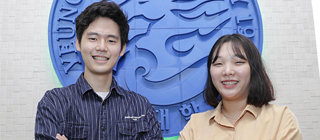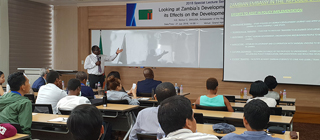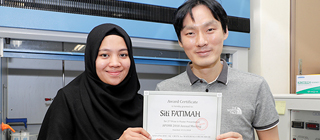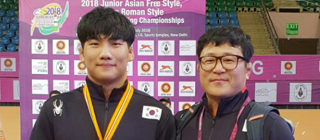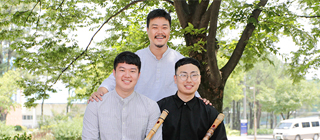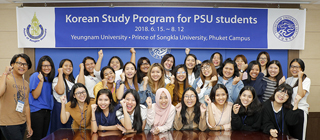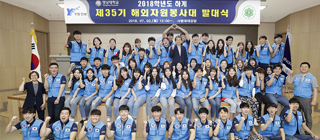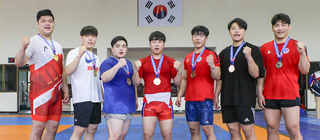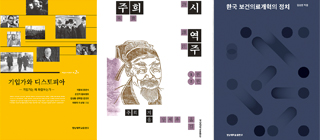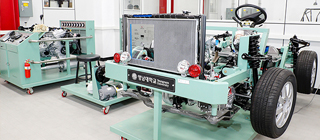-
YU increases students selected for overseas dispatch programs supported by the EU, Ministry of Education and companies Students sent for internships and exchange student programs with financial aid in tuition, airfare, and living expenses to lower financial burdens “Diverse external institute and educational expense support programs will provide more opportunities to improve global capacities” [July 23, 2018] <YU students participating in overseas dispatch programs such as internships and exchange student programs with government and corporate support> (Left to right: Lee Ho-ryun (Participated in the National Institute for International Education WEST program), Choi Yoon-ji (Selected as overseas exchange student for Mirae Asset)> There is a growing number of YU students participating in overseas exchange student programs and internships receiving support such as scholarships from the EU, central government, local government, and private companies. Just in the second half of this year, 23 YU students will be dispatched with external support such as from the National Institute for International Education (WEST program), Mirae Asset overseas exchange student scholarship program, and the Gyeongsangbuk-do collegiate overseas internship program. The National Institute for International Education’s ‘WEST (Work, English, Study, Travel)’ program is a long-term (12-18 months) overseas dispatch program combining language studies and corporate (institutional) internships. Participating students complete a language program to adapt to the local environment and gain practical English skills. Afterwards, they work as interns at local companies, giving them the opportunity to gain language skills and practical work experience. In particular, this is an inter-government project in which a sponsor institute recommended by the US State Department is responsible for the participant’s language training and finding institutes for internships, and is therefore receiving huge interest from students as it is possible to participate in stable programs. Participants receive financial aid from the government for their airfare and parts of living expenses during their language course and internship. In the first half of this year, four YU students were selected for this program. Lee Ho-ryun (23), a senior in the YU Department of Physics who departed for Seattle on July 17 after being selected as a participant in the WEST program, said, “After graduating, I plan to go on to graduate school. In the case of the WEST program, I can work as an intern for not only regular companies, but also in university labs in the US, and that is why I applied. I received a lot of assistance while drafting my cover letter and preparing for the interview, and I think this helped me pass.” He added, “I have high expectations for the language program that I will take part in prior to the internship as it is made up of a colorful curriculum. If I have the opportunity, I want to go on a road trip in the western part of the US after completing my internship.” There were a number of YU students who were selected for overseas dispatch programs sponsored by companies. Five YU students were selected for the 22nd Mirae Asset Overseas Exchange Student Scholarship Program who will be dispatched in the second semester of this year. This program, which is sponsored by the Mirae Asset Park Hyun-joo Foundation, selected students to be dispatched as exchange students and will provide 7 million won as scholarships for one semester. Choi Yoon-ji (21), a junior at the YU School of International Economics and Business who was selected in the 22nd Mirae Asset Overseas Exchange Student Scholarship Program and will go to the University of Warsaw in September, said, “My goal is to take advantage of my major and become a commerce expert. As an exchange student, I hope to share opinions with foreign students who are in the same major as I am, and see for myself the geographical conditions of Europe, the ports of each country, convention facilities, etc. I think this will move me a step closer to realizing my dream.” YU will also send students to Europe through the EU’s [ERASMUS (European Region Action Scheme for the Mobility of University Students) Plus Program]. Students selected for this program will receive financial aid of 4,000 euros by the EU. The first exchange student in the first semester of this year for the ERASMUS Plus Program was Jang Sang-yoon (23), a senior in the YU School of International Economics and Business who studied at the D.A. Tsenov Academy of Economics in Bulgaria. He said, “Thanks to the financial aid of about 5.5 million Korean won provided by the EU, I was able to spend my time as an exchange student without much financial difficulty.” He added, “In particular, students from different parts of Europe participating in the ERASMUS program lived together as exchange students, which helped me to adapt easily to life in an unfamiliar foreign country. Studying with students from countries such as Albania, Macedonia, etc. that are not easy to come by and experiencing various countries will be an unforgettable memory.” In addition, 14 other students were selected in the Gyeongsangbuk-do college student overseas internship project to work in local US companies in the second half of this year, and thus, there is a growing number of YU students being dispatched overseas with support from external institutes. This is thanks to YU’s efforts to work with other institutes so that participants can participate in various international programs. YU External Cooperation Office Director Heo Chang-deok said, “There are various international programs such as long-term overseas dispatch programs such as exchange student and foreign internship programs, as well as short-term dispatch programs that offer financial aid. I hope that students will participate in programs fitting to them to enhance their global competitiveness.” He added, “Especially in the case of long-term dispatch programs, by making plans early on their college career and making careful preparations, there will be more opportunities available.”
-
Discussed plans for sharing the Saemaul Undong and international development academic system and on mutual cooperation Held special lecture and meeting for international students at the YU Park Chung Hee School of Policy and Saemaul Invited ambassadors to Korea to share cases on international development cooperation growth experiences [July 27, 2018] <Zambian Ambassador Wylbur Chisiya Simuusa to Korea and his delegation visited YU to discuss cooperation plans for Saemaul international development.> Zambian Ambassador Wylbur Chisiya Simuusa to Korea (top photo, third from right) visited YU. On the 27th, Ambassador Simuusa visited YU and met with YU President Sur Gil-soo, Park Chung Hee School of Policy and Saemaul Dean Kim Ki-su and Global Saemaul Development Network (GSDN) Chairman Choi Wae-chul (Professor at the Department of Saemaul and International Development) to discuss plans for sharing the academic system of the Saemaul Undong and international development accumulated by YU and on mutual cooperation. Ambassador Simuusa also gave a special 90 minute lecture on the theme ‘Zambia’s development policies and its effects’ to international students at the Park Chung Hee School of Policy and Saemaul. About 100 international students in the Park Chung School of Policy and Saemaul were present at the special lecture. A total of three students from Zambia graduated from the YU School of Policy and Saemaul and there are currently four students studying here. <Ambassador Wylber Chisiya Simuusa to Korea giving at special lecture at the Park Chung Hee School of Policy and Saemaul> In April, Rwandan Ambassador to Korea Emma Isumbingabo visited YU to give a special lecture. Ambassadors from different countries are coming to YU to share their nation’s policies and to exchange opinions on Saemaul international develop with international students at the Park Chung Hee School of Policy and Saemaul. YU Park Chung Hee School of Policy and Saemaul Dean Kim Ki-su said, “The most important thing for these students who will become international development and regional development experts after graduating is to share development policies and cases pursued by different countries.” He added, “In particular, listening to the lectures and exchanging opinions with the head of diplomatic envoys who are dispatched to different countries to conduct international cooperation work and make policy decisions will be valuable assets for them.” Meanwhile, the YU Park Chung Hee School of Policy and Saemaul is planning to continue to invite ambassadors to Korea to hold special lectures on official development aid (ODA), international development cooperation, and development experiences, while sharing the international develop cases of different countries.
-
Student in the master’s and PhD integrated program at the Graduate School of Materials Science and Engineering Second place in the international academic conference in the materials sector, ‘APSMR’ poster presentation YU students win first to third place last year, followed by second place this year, thus receiving international recognition on research capacities [July 26, 2018] <Graduate School of Materials Science and Engineering students Siti Fatimah who won second place for poster presentation at the international academic conference ‘2018 APSMR’ (left) and Professor Koh Young-gun> Siti Fatimah (28, Integrated master’s and PhD course term 6) from Indonesia who is currently studying at the YU Graduate School of Materials Science and Engineering was awarded 2nd place in poster presentation at the annual meeting of the ‘2018 APSMR (Asia Pacific Society for Materials Research)’, which is an international academic conference in the materials sector. APSMR international academic conference is an Asia Pacific society joined by over 200 researchers from universities and research institutes of countries such as Korea, Japan, China, Taiwan, etc. Ms. Fatimah is a graduate school student at the YU School of Materials Science and Engineering Professor Koh Young-gun’s research lab. Professor Koh’s research lab swept first to third places in the poster presentation sector at this academic conference last year, thus being recognized globally for its research capacities. At this year’s conference held in Hokkaido, Japan from July 19 to 21, Siti Fatima took second place in the poster presentation sector, thus having YU be awarded for the second straight year. Fatimah made a presentation on the latest research results on ‘high performance surface treating technologies applying plasma electrolytic oxidation technologies’ to capture the attention of academics. For the past two years, Fatimah has been active in research and published the basic and application research results on ‘plasma electrolytic oxidation technologies’ in prominent international journals in the materials engineering sector such as the ‘Journal of Alloys and Compounds’, ‘Applied Surface Science’ and ‘RSC Advances’. Her advisor, Professor Koh Young-gun said, “The research results that were awarded will contribute in the innovation of eco-friendly biomaterial surface treating technologies that have recently drawn a lot of attention.” Meanwhile, this research was conducted as part of the ‘science technician exchange promotion support project’ funded by the Ministry of Education.
-
-
Took first place in the ‘Daegeum’ sector in Korea’s most prestigious concours celebrating its 34th anniversary Kwon Min-chang won the overall grand prize in the Daegu Gugak Music Festival [July 17, 2018] <YU College of Music (major in Korean Music) students won the gold and silver at the daegum sector of the 34th Donga Gugak Concours.> (Top, YU College of Music Major in Korean Music Daegeum (large bamboo flute) advisor Lee Young-seop, bottom left to right, Kwon Min-chang, Kim Yoon-woo) YU College of Music students majoring in Korean music won first and second place in the daegum sector of the 34th Donga Gugak (traditional Korean music) Concours. They are YU College of Music seniors Kwon Min-chang (23, gold) and Kim Yoon-woo (25, silver) who major in Korean music (instrumental music). The judges said that Kwon Min-chang’s creative piece had an easy-going flow and the sounds were mature, while saying that Kim Yoon-woo’s music composition was excellent. The two students are already famous among traditional musicians. Kwon Min-chang, who won the gold at the Donga Gugak Concours, made news by taking the overall top (Minister of Culture and Sports Award) at the regular session of the 28th Daegu Gugak Music Festival’s National Gugak Competition last year. The overall first place goes to the best musician in all sectors such as instrumental music, pansori, dance, folk music and pungmul. Furthermore, at the Hwasun Jeokbyeok National Gugak and Yeongsanjakbeop Competition on July 15 of this year, he won first place as well (Governor of Jeonnam Award)’. Kim Yoon-woo, who won silver, was recognized for his skills in the daegeum collaboration with the Daejeon Yeonjeong Korean Traditional Music Center last year. The Donga Gugak Concours was first held in 1985. It is a prominent competition that discovered many talented musicians who are now leaders of the traditional Korean music sector in Korea such as Professor Heo Yoon-jung of Seoul National University, Professor Yoo Young-joo of the Korea National University of Arts, and Professor Lee Young-seop of YU. This concours, which was hosted by Donga Ilbo and the National Center for Korean Traditional Performing Arts and sponsored by Lotte Group, held its preliminaries and finals from June 9 to June 30. A total of 43 musicians were awarded in nine sectors (composition, pansori, vocal music, geomungo, flute, daegeum, haegeum, ajeng) and seven sectors for students (excluding composition and ajeng).
-
Songkla University students from Thailand learn about Korea for 8 weeks such as Korean language, culture, economics, history, etc. YU-Songkla University to operate regular ‘Short-term Korean language programs’ Expected to diversify nations for international students and expand number of Thai students [July 4, 2018] <<Songkla University students from Thailand visiting YU to learn about Korea> Learning about Korea is becoming popular among Thai college students. Recently, 28 sophomores and juniors majoring in international studies from the Prince of Songkla University, Phuket Campus from Thailand are coming to Korea to learn Korean and about Korea. They selected YU to learn about Korea. After starting their studies at YU from Jun 15, they will learn about Korean including the Korean language, cultural experience, and field-learning programs for eight weeks until August 12. All expenses for this were paid by Songkla University. The Thai students who came to YU major in Korean studies. They are learning not only the Korean language, but also about Korea’s culture, history and politics. They will complete the short-term Korean language education program during their summer vacation. Suteephat, Sriphol, a junior at the Songkla University Department of International Studies who participated in this program said, “I majored in Korean studies because I was very interested in Korean culture such as K-pop. I am now not only interested in the Korean language and Korean culture, but also other fields such as Korean history and politics. During this program, I hope to improve my Korean skills and experience the diverse cultures of Korea through field-training.” Pemika Pereepas (sophomore) said, “I remember trying ttokboki and samgyetang at a Korean restaurant in Thailand and it was very good. I want to try various food cultures while in Korea.” During their training period, the students will visit major attractions and industries of the Daegu and Gyeongbuk areas and Seoul such as Daegu Samsung Lions Park, Daegu National Science Museum, Seoul Cheonggyecheon, Lotte World 2, Ulsan Hyundai Motors, and Pohang POSCO to experience the culture and economy of Korea. They will also visit Gyeongju Bulguksa Temple, Cheomseongdae and Andong Hahoe Village and experience the culture and history of Korea that they learned in their studies. During the training, Thai students also take part in the Buddy Program with YU students. YU students will team up with Thai students and help them become familiar with Korean culture and adapt to the training as soon as possible. Thai students will use their leisure time such as weekends to spend time with Korean college students and experience Korean culture. YU External Cooperation Office Director Heo Chang-deok said, “Though we had a few international students at our graduate school, we had none in undergraduate or language courses. We are planning to regularly operate short-term Korean language programs with Songkla University in Thailand starting with this exchange.” He added, “Through this training, it is expected that we will be able to diversify nations from which international students come from and attract more students from Thailand.”
-
Over 460 students dispatched over summer break for overseas volunteer programs, overseas internships, backpacking, overseas field trips linked to majors, visits to advanced industries, etc. Overseas volunteer corps, “We will elevate the status of Korea as YU ambassadors!” [July 3, 2018] <The 35th Overseas Volunteer Corps launching ceremony was held at the YU College of Education auditorium in the afternoon of the 2nd.> YU students will travel around the world this summer break to elevate their global capacities. YU operates various overseas dispatch programs during vacations every year. This summer break, around 460 YU students will embark to different parts of the world. One of the most famous overseas dispatch programs of YU is the ‘overseas volunteer corps’. A total of 2,570 students participated in a total of 34 overseas volunteer corps programs since 2001. This summer break, the 35th overseas volunteer corps will be sending 57 students to Laos, Mongolia and Uzbekistan to engage in overseas volunteer programs. They held a launching ceremony at the YU College of Education auditorium at 3 p.m. on the 2nd and will take part in volunteer activities for two weeks during July. The volunteers will go to local elementary schools to volunteer in education and environmental improvement. The volunteers will be divided into the four teams of education, art, physical education and culture where they will provide Korean and English education, Korean music, masked dance and traditional Korean games to spread the Korean culture. During their volunteer period, they will also conduct educational environment improvement activities such as repairing the floors in elementary schools. Bae Jae-han (24, School of Economics and Finance, senior), who is the team leader of the Mongolia team in the 35th overseas volunteer corps, said, “It is the first time going overseas for volunteer activities, so there are many things to prepare for. Our team members shared the work and made a lot of preparations, so I am sure that we our volunteer services will be helpful at the site.” Bae added, “As we are representing YU, we will do our best to elevate the status of Korea and YU.” <YU overseas volunteer corps> One of the most popular overseas dispatch programs supported by YU is ‘Window To the World’. In ‘Window To the World’, students make up teams and set their own theme to go on backpacking trips around the world. Selected students are given round-trip airfare, etc. by the school. Since starting in 2002, a total of 2,520 students traveled around the world. This summer 122 students will go backpacking around the world such as Europe, Australia, Japan, China, etc. in teams of 2 and 3. In addition, about 280 students will participate in overseas internships programs at local businesses abroad in the US, Hong Kong and Japan, as well as field trips to overseas companies, overseas field work linked to majors, short-term language programs, and overseas business start-up programs in England, Taiwan, Thailand, China, Cambodia, Philippines, Indonesia, Vietnam, etc. Thus, a total of 460 people will travel around the world this summer break. YU President Sur Gil-soo said, “I hope that during this summer break, students will be able to travel around the world to broaden their horizons and have the opportunity to amass various activities,” and added, “YU will develop and support a wider variety of overseas dispatch programs so that more students will be able to gain a broader global mindset.”
-
‘4 golds, 1 silver, 2 bronze’ Brilliant record following the ‘overall victory’ at the 36th National Wrestling Championship back in March YU Wrestling’s golden age by winning the national championship and being selected as national representatives [July 3, 2018] <YU wrestling team that swept 7 medals at the 43rd KBS National Wrestling Tournament> (Left to right: Kim Sung-soo, Park Cheol-woong, Ban Chang-hwan, Kim Ha-neul, Kim Yong-hak, Kim Jong-won, Han Hyun-soo) The YU wrestling team (Coach Kim Ik-hee) took home seven medals including four gold medals at the 43rd Yang Jung-mo Olympic Victory Commemoration KBS National Wrestling Tournament. At this tournament held at the Wooseul Gymnasium in Haenam-gun, Jeonnam from June 20 to 26, YU won four gold medals, one silver and two bronze medals for a total of seven medals. Kim Ha-neul (21, Sports Science, junior, 65kg), Kim Yong-hak (20, Special Physical Education, junior, 76kg), Park Cheol-woong (21, Special Physical Education, senior, 97kg), and Kim Sung-soo (20, Special Physical Education, 125kg) struck gold, Han Hyun-soo (20, Special Physical Education, 125kg) won silver, and Kim Jong-won (21, Special Physical Education, senior) and Ban Chang-hwang (20, Special Physical Education, sophomore) won bronze in the 92kg class. At the 36th National Wrestling Championship, the YU wrestling team took a total of eight medals comprised of two golds, three silvers, and three bronze for overall win in March of this year. Last year, at the 28th Autumn National Wrestling Championship held in December, they won a total of eight medals including four golds, one silver and three bronze for overall victory, thus becoming the top name in college wrestling. <YU Wrestling Team> Coach Kim Ik-hee, who is leading the golden age of YU wrestling, said, “I am thankful to the students who worked hard and followed my leadership despite their busy schedule of schoolwork, training and various tournaments.” He added, “We will continue training hard to continue the golden age of YU wrestling.”
-
‘Entrepeneurs and Dystopia’, ‘Translation and Annotations of the Poems of Zhu Xi’, ‘Politics of Korean Health and Medicine Reforms’ Selected as the ‘2018 Best Academic Books and Support Program’ of the Ministry of Education A total of 50 books published by the YU Publication Center selected as best books [July 2, 2018] <Three books published by the YU Publication Center selected as ‘Best Academic Books’ by the National Academy of Sciences> Three books published by the YU Publication Center were selected as best academic books by the National Academy of Sciences. The books are ‘Entrepeneurs and Dystopia’ (Lee Jung-hee, et al), ‘Translation and Annotations of the Poems of Zhu Xi’ (translated by Jang Se-hoo), and ‘Politics of Korean Health and Medicine Reforms’ (Kim Sun-yang). ‘Entrepeneurs and Dystopia’ examine the initial prosperity and success of companies and entrepeneurs in various countries followed by tragic confrontation and conflict, and failure as dystopia and studies it from various aspects. The authors claim that the abilities of entrepreneurs that produce utopia can lead to falling into dystopia. They focus on the dark side of corporate activities and try to take on a balanced approach to reveal all aspects of corporate activities. ‘Translation and Annotations of the Poems of Zhu Xi’ is a translation of the poems written by the philosopher, Zhu Xi. This collection includes all 1,500 plus poems found in the 10 volumes of ‘Jumungongjip’ and other books. Lastly, ‘Politics of Korean Health and Medicine Reforms’ constructed a comprehensive analysis frame to analyze the political dynamics of the process of health and medicine reforms in Korea. Based, on this, it compares and analyzes major health and medicine reform cases for the politics of health and medicine reforms that continued for over 50 years since the 1960s. It analyzes the beliefs and understanding of the relevant persons during the course of health and medicine reform up until now, direction of public benefit, government roles and political intent, strategic behavior of the actors, etc. in a systematic manner, while empirically examining conflicts, resistance, successes, and failures that occurred during the course of health and medicine reforms Meanwhile, these books were selected for the Ministry of Education’s ‘2018 Best Academic Books and Support Program’ and they will be purchased by the National Academy of Sciences and distributed to college libraries and public libraries around the nation. A total of 50 books published by the YU Publication Center have been selected as best books by outside institutes.
-
Part of Ministry of Education’s PRIME Project... Newly established Robot Engineering Department and Automobile Engineering Department last year Equipped with design and production lab such as drones, balancing robots and self-driving cars Focusing on fostering experts in the robot and automobile sectors [June 21, 2018] YU (President Sur Gil-soo) opened the Robot Hall and Automobile Hall. This aims at fostering experts in the robot and automobile sectors, which are core industries of the next generation. At 2 p.m. on the 21st, YU held an opening ceremony for the Robot Hall and Automobile Hall to focus on fostering talents in the robot and automobile sectors. The robot and automobile sectors key fields that were selected by YU as future growth-engine fields and the Ministry of Education’s PRIME (PRogram for Industrial needs – Matched Education) project. <Robot Hall Lab> The robot hall stands three stories tall with a basement level and has a total floor space of 3,462.71m2 and is comprised of the blended learning lecture room, lab, and robot fun shop. It is equipped with a lab for producing robots modeled with 3D printers from drones, balancing robots, and arduino compatible human robots. The automobile hall has three stories and a total floor space of 3,934.89m2. It is equipped with a smart lab for one-stop projects that students can use for classes and for design, production etc., as well as a power train lab and self-driving automobile lab. The robot hall and automobile hall were made by renovating two buildings that were used as labs. Construction costs were paid for by national funding for the PRIME project. <Automobile hall lab> At the opening ceremony, YU President Sur Gil-soo said, “With the opening of the robot hall and automobile hall, we now have an educational environment where students can share their creative ideas and indulge in convergence and integration research.” He added, “The robot and automobile fields are core industry sectors of the fourth industrial revolution that combines various majors and knowledge. We will spare no support for creating a research and education infrastructure to lead the fostering of professional talents that will lead the future core industries.” Meanwhile, YU was selected for the Ministry of Education’s PRIME project in 2016 and has been pursuing projects for three years. As part of this, YU separated the electric, electronics, computer, information communication, and mechanics majors in the College of Engineering in 2017 to establish the College of Mechanical and IT Engineering, while newly establishing the Department of Robotics and Intelligent Engineering and the Department of Automotive Engineering. Using its mechanical, electric, electronic and computer engineering fields that YU has traditionally been strong in, YU is utilizing the College of Mechanical and IT Engineering to focus on nurturing the intelligent robotics and future automobile sectors, which are future growth-engine fields.
